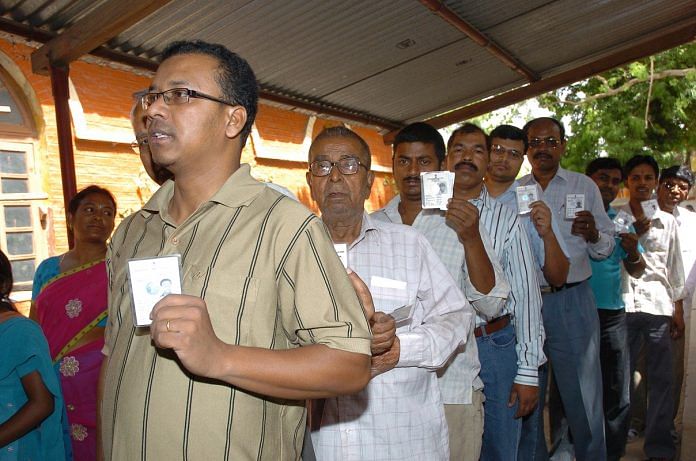The vital civic body elections were held in Haryana’s five big cities with a number of electoral innovations.
Chandigarh: Elections to the municipal corporations of Rohtak, Hisar, Panipat, Karnal and Yamuna Nagar were held Sunday. They could have passed off as any other municipal election in Haryana but there are several firsts to these elections, particularly with regard to the mayoral posts.
With assembly elections due next year, the contest to grab the five important municipal towns has also turned into a keen one. While the BJP, the BSP and the Indian National Lok Dal (INLD) candidates are fighting on their party symbols, Congressmen are contesting as independents.
There are 694 candidates in the fray for the corporator posts, while 59 have filed nominations for the mayoral posts, which for the first time will be determined through direct elections. The results will be declared on 19 December.
Here are five reasons why you should be interested in these elections:
1. This is the first time that direct elections were held for the mayoral posts. In the system followed earlier, corporators were elected and they then chose the mayor from among themselves. “This system led to horse-trading and sharp divisions within the corporations,” said Dalip Singh, the Haryana state election commissioner. “In the new system the electorate will elect the corporator of his or her area as also the person whom they want to see as mayor.”
Since every voter will vote for two posts — of the mayor and the corporator — multi-post EVMs were used. “Two EVM machines will be connected to allow the voter to vote separately for the two posts,” explained Dalip Singh.
2. The move to have a directly elected mayor will also ensure stability within the corporation. Earlier a mayor could be upstaged with a no-confidence motion moved by the corporators.
This meant that most of them did not last for more than a year or two in the post.
Now, an elected mayor will have a full five-year term. This is also one of the reasons that political parties are taking these elections very seriously. Senior leaders have been campaigning for the candidates and the choice of candidates has been approved by the top-most state leaders of each party. Since assembly elections are expected to be a close contest, the ruling BJP would want its own men in the mayoral posts for a full term.
3. This is the first time ever in any election in India the option of NOTA (None of the above) is being considered a “fictitious candidate”. In other elections, the number of votes that are gathered by NOTA have no impact on the results. These are simply counted and ignored.
Also read: In Gujarat, NOTA got more votes than AAP
“That defeats the whole purpose of having such an option,” said Dalip Singh. He said that in these elections, if NOTA beats all the candidates, the elections will be cancelled and held again.
In the fresh elections, the candidates who had lost to ‘NOTA’ will not be allowed to contest.
4. The state election commission set a minimum education qualification, of Class 10, for the candidates. Haryana chief minister Manohar Lal Khattar had mooted the idea of a minimum education qualification for candidates in the assembly and parliamentary elections but his idea was rejected. The state government then laid down a minimum education qualification for those contesting panchayat and urban local body elections in the state. “The candidate has to be at least a matriculate to contest the mayoral or corporation elections,” said Dalip Singh.
The state election commission is also strictly imposing the restriction on candidate expenditure. “The expenditure has been fixed at Rs 20 lakh for the mayor and Rs 5 lakh for the corporators. Anyone who falters will be disqualified from contesting the next time,” said Dalip Singh. “In the last polls, we had disqualified over 630 candidates who were barred from contesting this time.”
5. The EVMs used for voting also carried the photograph of the candidate. “This has been done in some state elections but it is being done for the first time in municipal polls,” said Dalip Singh. “A photograph brings clarity to the voter and also ensures that candidates with the same names or similar names do not get away with votes meant for another person.”
Also read: Eye on Haryana polls, Arvind Kejriwal blames Punjab farmers for Delhi’s air pollution



